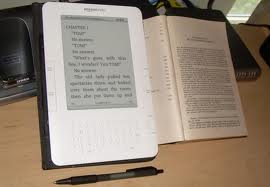Textbooks face terminal disease with the advancement of technology, especially tablets and e-readers – Part 1
Saturday, January 28th, 2012 4:09:35 by Usman Khalid
Dan Rosensweig is open to the idea that the textbook as we know it will someday no longer exist. He just doesn’t think it’s going to happen anytime soon. “Anything is possible,” says Rosensweig, the chief executive of Chegg.com, a five-year-old company that rents textbooks to college students on 7,000 campuses. “But if you spend any time in higher education, you realize that we’re dealing with the same education system that existed 200 years ago.” The more immediate change, says Rosensweig, is in how and where students buy content, not the content itself. His bet will determine the future of Chegg—which is not profitable but generated estimated revenue of $200 million last year, up about 38% over 2010.
Textbooks, a capital-intensive, low-turnover business, are ripe for disruption. Undergrads at private four-year colleges spend an average of $1,213 on textbooks every year; nationwide, including K–12, textbook sales are a $10 billion industry and have been rising at twice the rate of inflation over the past 20 years.
The question is whether Chegg, the best funded of a group of firms vying to control textbook rentals, will be around long enough to be the disrupter. It has raised a huge amount of money since 2007: $221 million from venture firms such as Kleiner Perkins Caufield & Byers and Insight Venture Partners. (Its closest competitor by market share, Bookrenter.com, has raised $60 million since 2009.) But while Chegg, based in Santa Clara, Calif., has been investing “tens of millions of dollars” in technology that helps it to determine the best price to buy, sell and rent books, the industry is changing around it.
Today Chegg charges between $10 and $174 for a textbook rental of up to 125 days. The continued growth in e-textbooks, which Chegg already sells, could crush Chegg’s traditional business. Apple in late January announced that it will sell $15 electronic versions of K–12 textbooks, which usually sell for $75. Colleges and publishers are starting to offer lower-priced digital course material, and Amazon and Barnes & Noble are offering cheaper shipping costs and rental options for traditional textbooks.
Tags: Amazon, Apple, book lenders, Books, chegg, e readers, tablets, textbooksShort URL: https://www.newspakistan.pk/?p=10877

















